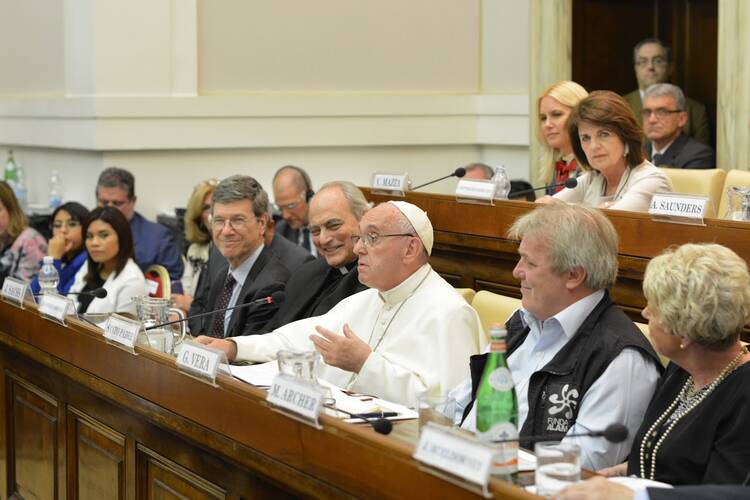In a strong, encouraging speech, Pope Francis called on judges and prosecutors attending a Vatican summit on human trafficking “to pay special attention to justice” and to the “organized crime” that is linked to trafficking.
“You are responsible for executing justice,” he told them, the ones “called to give hope.” He reminded them that the suffering of the victims of human trafficking “fuel a desire for justice and a hope that the injustice that passes through this world is not final.” He said, “Their traffickers and executioners must be given no quarter.”
Francis arrived at the end of the first day of the summit on June 3 and was given a warm welcome by some 100 judges and prosecutors from many countries—including the United States—and all continents. They had spent the day sharing experiences in tackling cases of human trafficking and making proposals for better national and transnational action to combat these crimes which have made victims of an estimated 40 million men, women and children. (See update on the closing declaration and list of goals to combat human trafficking.)
After thanking them for the great work they are doing in this field, often in difficult and sometimes threatening circumstances, Pope Francis encouraged them “to fulfill their vocation and their crucial mission—to establish justice—without which there is neither order nor sustainable and integral development, nor social peace.”
He emphasized the importance of their work in defense of “the dignity and freedom of men and women today” and, in particular, “to eradicate human trafficking and smuggling and the new forms of slavery such as forced labor, prostitution, organ trafficking, the drug trade and organized crime.” He again denounced these forms of modern slavery as “real crimes against humanity” and said they should be recognized as such by all religious, political and social leaders—and reflected in national and international laws.”
He insisted, however, that punishment of the criminals “must not be an end in itself”; it must offer a path to rehabilitation because “there is no valid punishment without [offering] hope.” In this context, he repeated his call for the abolition of the death penalty, where “the only hope left is to go to the next world.” And speaking from his own experience in visiting prisons, he said he has found that women governors of prisons are particularly good in the work of rehabilitation.
He offered a concrete suggestion regarding the punishment of the criminals who are engaged in human trafficking and the other forms of modern slavery, suggesting that other countries might follow the example of Italy by “recovering the ill-gotten gains of traffickers and criminals and offering them to society and, in particular, for the reintegration of the victims.”
He urged the judges, in particular, to focus “on the needs of the victims” and said, “the victims are the first who need to be rehabilitated and reintegrated into society.” He recalled that they have been betrayed and suffered terrible violence “from the new slave hunters” and emphasized that the “rehabilitation of victims and their reintegration into society, always a real possibility, is the greatest good we can do for them, for community and for social peace.”
Victims “can recover,” he said, and “can regain control of their lives with the help of good judges, social workers and society as a whole.” He cited the “good number of survivors who are now lawyers, politicians, brilliant writers, or have a successful job serving the common good in a valid way.”
From his years as a bishop in Argentina (1992-2013), and even more since becoming pope, Francis has become greatly aware of the forces, emanating out of organized crime enterprises, that can ensnare officials in the government, in the judiciary and in police forces. He urged the assembled judges “to take care not to fall into a web of corruption.” He described corruption as “one of the greatest social ills of the world today,” saying it “weakens any government, participatory democracy and the activity of justice.”
He also encouraged judges to preserve their independence. He told them that “taking charge of one's own vocation also means feeling, and proclaiming oneself, free from the pressures of governments, private institutions and, of course, the ‘structures of sin’ of which my predecessor John Paul II spoke, particularly in regard to organized crime. Without this freedom, a nation's judiciary is corrupted and corrupting.”
He reminded the judges and prosecutors that they now have a mandate from the United Nations General Assembly to help them in this field because 193 member states unanimously approved the new Sustainable Development Goals, and in particular Goal 8.7, which the Holy See had actively promoted. This goal calls on states to "take immediate and effective measures to eradicate forced labor, end modern slavery and human trafficking, and secure the prohibition and elimination of the worst forms of child labor, including recruitment and use of child soldiers, and by 2025 end child labor in all its forms."
Francis said such goals and targets are now “a moral imperative” for all member states of the United Nations, and the judges can press for their implementation in their home countries.
During the first day of the summit, many speakers had praised the lead role that Pope Francis is taking on human trafficking and modern forms of slavery, and several referred to his encyclical “Laudato Si'” and what it has to say about it.
When Pope Francis finished his address, the judges and prosecutors applauded enthusiastically and then joined him for a photo-op in front of the Casino Pio IV, the seat of the Pontifical Academy of Sciences, which has organized and is hosting this summit. After a group photo, they surrounded the pope, spoke and took selfies with him, and Francis gave himself happily to them for almost half an hour.
Before departing, he signed the declaration from the summit in which the judges and prosecutors commit themselves to work together to combat these “crimes against humanity.” He was the first to do so.








